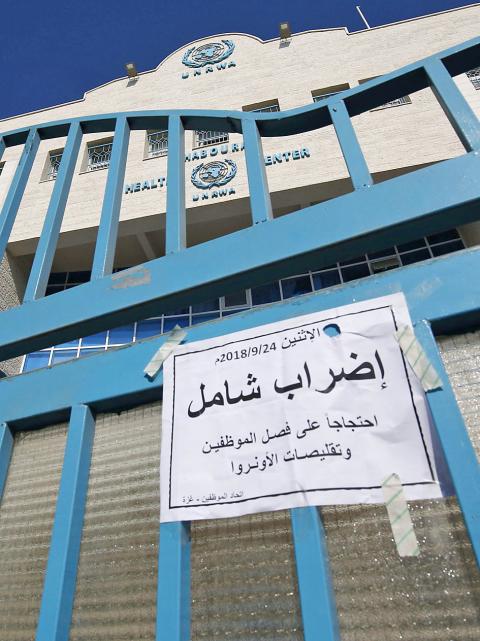The Gaza Strip’s economy is in “free fall” as cuts to aid and salaries add to an already crippling Israeli blockade on the Hamas-run enclave, the World Bank said on Tuesday.
The bank’s report is to be presented to the international donor group for Palestinians, known as the Ad Hoc Liaison Committee, tomorrow at its meeting on the sidelines of the UN General Assembly in New York City.
The meeting is to coincide with the speeches to the assembly of Palestinian President Mahmoud Abbas and Israeli Prime Minister Benjamin Netanyahu.

Photo: AFP
Already squeezed by a more than decade-long Israeli blockade, Gaza’s economy has been further weakened by US aid cuts and financial measures by Abbas’ Palestinian Authority.
Abbas has been seeking to pressure Islamic movement Hamas, which expelled his loyalists from the territory in 2007, as well as save costs.
He has reduced monthly payments to Gaza by about US$30 million, according to the World Bank.
US President Donald Trump’s administration has cut more than US$500 million in aid to the Palestinians, including ending all support for the UN Relief and Works Agency for Palestine Refugees.
“The economic deterioration in both Gaza and West Bank can no longer be counteracted by foreign aid, which has been in steady decline, nor by the private sector, which remains confined by restrictions on movement, access to primary materials and trade,” the bank said.
Gaza’s economy shrunk by 6 percent in the first quarter of this year “with indications of further deterioration since then,” it said.
One in two Gazans now lives below the poverty line and unemployment is 53 percent, the bank said, adding that more than 70 percent of young people are jobless.
“Increased frustration is feeding into the increased tensions which have already started spilling over into unrest and setting back the human development of the region’s large youth population,” World Bank director for the West Bank and Gaza Marina Wes said.
On Thursday last week, UN envoy for the Middle East peace process Nickolay Mladenov told the UN Security Council that “Gaza can explode any minute.”
Israel and Palestinian militants in Gaza have fought three wars since 2008.
In recent months, mass protests along Gaza’s border with Israel have triggered repeated deadly clashes with the army, prompting warnings of the risk of a new conflict.
At least 187 Palestinians have been killed by Israeli fire since the protests began on March 30. One Israeli soldier has been killed in that time.
Israel says its actions are necessary to defend the border and accuses Hamas of using the protests as cover to attempt infiltrations and attacks.
Palestinians and human rights groups say protesters have been shot while posing no real threat.
Mladenov and Egyptian officials have been seeking to broker a long-term truce between Israel and Hamas, but those efforts have stalled in recent weeks.

In Italy’s storied gold-making hubs, jewelers are reworking their designs to trim gold content as they race to blunt the effect of record prices and appeal to shoppers watching their budgets. Gold prices hit a record high on Thursday, surging near US$5,600 an ounce, more than double a year ago as geopolitical concerns and jitters over trade pushed investors toward the safe-haven asset. The rally is putting undue pressure on small artisans as they face mounting demands from customers, including international brands, to produce cheaper items, from signature pieces to wedding rings, according to interviews with four independent jewelers in Italy’s main

Japanese Prime Minister Sanae Takaichi has talked up the benefits of a weaker yen in a campaign speech, adopting a tone at odds with her finance ministry, which has refused to rule out any options to counter excessive foreign exchange volatility. Takaichi later softened her stance, saying she did not have a preference for the yen’s direction. “People say the weak yen is bad right now, but for export industries, it’s a major opportunity,” Takaichi said on Saturday at a rally for Liberal Democratic Party candidate Daishiro Yamagiwa in Kanagawa Prefecture ahead of a snap election on Sunday. “Whether it’s selling food or

CONCERNS: Tech companies investing in AI businesses that purchase their products have raised questions among investors that they are artificially propping up demand Nvidia Corp chief executive officer Jensen Huang (黃仁勳) on Saturday said that the company would be participating in OpenAI’s latest funding round, describing it as potentially “the largest investment we’ve ever made.” “We will invest a great deal of money,” Huang told reporters while visiting Taipei. “I believe in OpenAI. The work that they do is incredible. They’re one of the most consequential companies of our time.” Huang did not say exactly how much Nvidia might contribute, but described the investment as “huge.” “Let Sam announce how much he’s going to raise — it’s for him to decide,” Huang said, referring to OpenAI

Nvidia Corp’s negotiations to invest as much as US$100 billion in OpenAI have broken down, the Wall Street Journal (WSJ) reported, exposing a potential rift between two of the most powerful companies in the artificial intelligence (AI) industry. The discussions stalled after some inside Nvidia expressed concerns about the transaction, the WSJ reported, citing unidentified people familiar with the deliberations. OpenAI makes the popular chatbot ChatGPT, while Nvidia dominates the market for AI processors that help develop such software. The companies announced the agreement in September last year, saying at the time that they had signed a letter of intent for a strategic